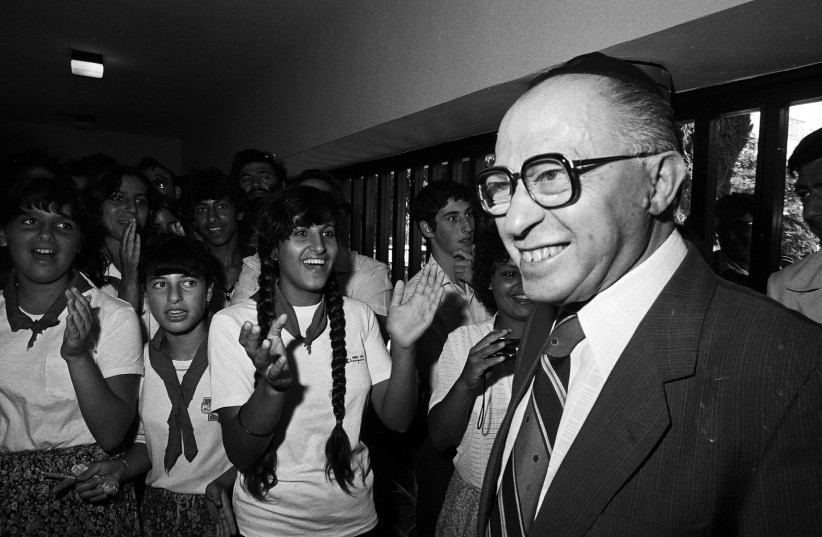Although Menachem Begin died 30 years ago, he continues to shape Israel – and inspire many of us.
Before 1977, when the Labor Party dominated Israeli politics and the American Zionist imagination, I was born into one of New York’s few Beginite households. My father, Bernard Dov Troy, had been involved in the Betar Zionist youth movement since his youth on the Lower East Side. We worshiped Israel’s longtime opposition leader, and David Ben-Gurion’s nemesis, Menachem Begin. I even invited him to my bar mitzvah.
We were among the few who rejoiced on the night of the “mahapach,” the Reversal, in May 1977, when Begin ended his three-decade futility streak and became prime minister. Most American Jews mourned, lamenting what Israel was becoming, devastated that Israel disappointed them, worried about the growing gap between Israel and American Jewry. Sound familiar?
Begin proved them wrong. Two months ago, working with Jerusalem’s Menachem Begin Center, Adam Bellos and the Israel Innovation Fund convened a panel discussion: “Hadar: Begin’s Lesson of Jewish Pride.”
I couldn’t resist such a speaking invitation, because “hadar” may be my father’s favorite word. Begin and my father followed Ze’ev Jabotinsky, whose resurrection of Jewish dignity began with hadar. Though not easily translated, the word connotes glory or splendor, meaning “outward beauty, respect, self-esteem, politeness, faithfulness” in “every step, gesture, word, action and thought.”

I started by saluting Begin for acting with “hadar” and making it contagious, bringing pride back to the name “Jew.” I hailed him as The Fighting Jew, the Holocaust survivor who led “The Revolt” before 1948 – articulating the new Zionist ethos, refusing to be cowed, of being militant when necessary but never unnecessarily militarist. “The Fighting Jew,” Begin proclaimed, “loves books, loves liberty and hates war. But he is prepared to fight for liberty.”
As prime minister, Begin followed that formula. He defied expectations by making peace with Egypt in 1978, then defied the world by bombing the Iraqi nuclear project, Osirak, in 1981, and attacking the PLO state-within-a-state in southern Lebanon in 1982.
Begin was also a patriotic Jew, who refused to be intimidated. In 1982, during what The New York Times called an “often acrimonious closed-door meeting with the Senate Foreign Relations Committee,” mostly over the Lebanon war, the “bitterest exchange” erupted between Begin and then-senator Joe Biden regarding settlements.
When Biden banged his fist angrily, Begin replied, “This desk is designed for writing, not for fists. Don’t threaten us with slashing aid. Do you think that because the US lends us money, it is entitled to impose on us what we must do? We are grateful for the assistance we have received, but we are not to be threatened. I am a proud Jew. Three thousand years of culture are behind me, and you will not frighten me with threats.”
Emphasizing the new patriotic Jews’ independence, Begin added: “We do not want a single soldier of yours to die for us.”
Begin also was, in many ways, Israel’s first Jewish prime minister. It wasn’t just his reverence for tradition. It wasn’t just his Western Wall pilgrimage after his election, to thank God for the responsibility and celebrate his bond with the Jewish past. But you could feel it in his mysterious bond with Israel’s then-neglected Mizrahi Jews. Here was the ultimate Eastern European Jew, born in Brest-Litovsk in today’s Belarus on August 16, 1913. Yet Mizrahi Jews embraced this lawyerly, formal, Polish-accented, suit-and-tie guy as “one of us” – because he was. His love for the Jewish people eclipsed any ethnic divisions, and they reciprocated.
Begin also epitomized the politician as mensch, living Jewish values. He was simple, humble, incorruptible and generous. His living room in his modest Tel Aviv apartment, now recreated in the Begin Center, demonstrates that he, like his rival Ben-Gurion, never exploited his public office for private gain.
When Avital Sharansky was crisscrossing the world, lobbying to free her refusenik husband, Natan, from the Soviet Gulag, she also ran up an insane phone bill, back when international long-distance calls were prohibitive. Begin’s secretary wondered, “Can the government pay her bill?” “The government cannot,” Begin replied, “but I can” – and he pulled out his checkbook.
Finally, this liberal-democratic Jew championed democracy, embracing it as a Jewish value rooted in the Bible’s egalitarian and communitarian ethos.
Members of the Likud Party he founded should recall that even when the Supreme Court made controversial decisions, he respected the court. His response “There are judges in Jerusalem” defended Israeli democracy and all its institutions, reflecting his commitment to human rights and his Jabotinskyite commitment to liberal individualism.
Ben-Gurion may have launched Israel’s democracy, but Begin first saved it, by refusing to risk civil war, even after Ben-Gurion (with Yitzhak Rabin’s help) sank the Altalena in 1948. Three decades later, Begin defended Israel’s democracy and helped modernize it, by launching the capitalist revolution behind today’s Start-Up Nation.
Remarkably, these distinctive Jewish dimensions of his persona and ideology didn’t live in constant combat with one another – they harmonized and reinforced one another.
Historians have much to debate about Begin’s legacy, from assessing his pre-1948 tactics to understanding his overreliance on Ariel Sharon during the 1982 First Lebanon War. But for his 30th yahrzeit on March 9 or the fourth of Adar Bet, in honoring this Fighting Jew, this patriotic Jew, this proud, literate Jew, this menschedik Jew, this liberal-democratic Jew, let’s demand leaders like Menachem Begin: with Zionist vision and a Jewish-democratic backbone.
The writer is a distinguished scholar of North American history at McGill University and the author of nine books on American history and three on Zionism. His book Never Alone: Prison, Politics and My People, coauthored with Natan Sharansky, was published by PublicAffairs of Hachette.
